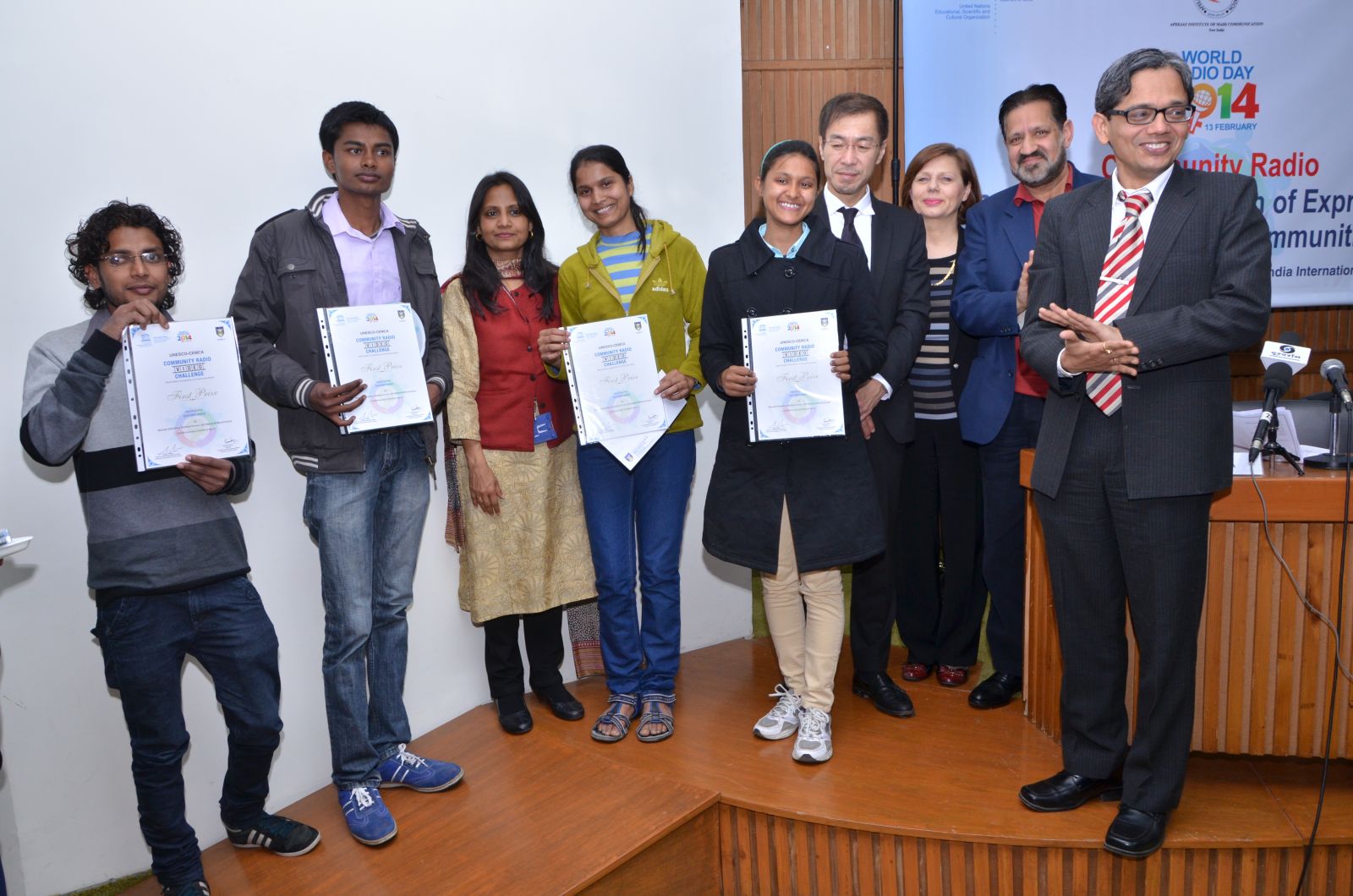Community Radio Video Challenge Award 2014

Commonwealth Educational Media Centre for Asia (CEMCA) in partnership with UNESCO, New Delhi observed the World Radio Day on February 13, 2014 at the India International Centre, New Delhi. On this occasion, a panel discussion on the theme ‘Community Radio: Strengthening Freedom of Expression and Empowering Communities’ was conducted followed by the awards distribution ceremony of the Community Radio Video Challenge.
For the first time in India, a competition of this kind was organised amongst Indian media students on the topic “Why Community Radio Matters” to engage the Indian youth in Community Radio initiatives and emphasize its role in community’s self-expression, learning and development.
Fifteen short videos on the theme received awards in various categories. The winning film ‘Aaji Kar Radio’, produced by a team from the Central University of Jharkhand in Ranchi, brilliantly portrayed the life-changing role CR could play for villagers by conveying information about Government welfare schemes. Besides a trophy and certificates, the winning team was awarded a cheque of INR 20,000. Two films won runners-up awards, five won second runners-up awards, and eight others were recognized for their creativity. All the films have been uploaded to YouTube. The Awards were distributed by Ms. Supriya Shau, Joint Secretary, Ministry of Information and Broadcasting, Govt. of India. Mr Shigeru Aoyagi, Director and UNESCO Representative to Bhutan, India, Maldives and Sri Lanka said that considering the population of India -- the largest democracy of the world, we need more community radio stations. He emphasized that CR can convey very relevant messages and topics like climate change adaptation, empowerment of women, human rights, democracy, women rights, etc in different local languages.
Ms. Supriya Sahu elaborated on the activities of Government of India to support and strengthen community radio, and highlighted the broadcasting scenario in in the country and the community radio support scheme. Dr. Sanjaya Mishra, Director, CEMCA stated that the 3 minutes video challenge competition has been taken up by the Indian media students well, and the results are quite encouraging. This will be an annual event with the support of all the stakeholders. The jury for the Awards was chaired by Prof. Ashok Ogra, Director of the Apeejay School of Mass Communication, New Delhi. While congratulating the award winners, Prof. Ogra thanked all the jury members for their support and explained the selection process. Arrangements were made for screening of a few selected videos, which are available at CEMCA website.
The panel discussion before the Award ceremony covered five key issues in the discourse about CR in India. These included the need for (a) allowing CR stations to broadcast news programmes; (b) closing existing gaps in efforts to raise awareness, build capacity and drive advocacy; (c) promoting gender inclusiveness at CR stations and within communities; (d) using CR to strengthen collective awareness about rights and entitlements; and (e) addressing the training needs of CR practitioners. Speakers on the panel included Prof. Vinod Pavarala, UNESCO Chair on Community Media, University of Hyderabad; Mr Rajiv Tikoo, Director, One World South Asia and Head, Community Radio Facilitation Centre; Ms Pooja Murada, Director (Communications), Institute of Rural Research and Development, Gurgaon; Ms Venu Arora, Director of Projects, Ideosync Media Combine, Faridabad; and Ms Archana Kapoor, Station Director, Radio Mewat, Mewat. Ms. Iskra Panevska, Adviser, Communication and Information for South Asia of UNESCO welcomed the guests and speakers, and highlighted the importance of the World Radio Day. Dr. Mishra facilitated the session and concluded that there are “miles to go before we sleep”. The consensus on the panel was to have more information to the people through CR, strengthen advocacy and capacity building, gender sensitisation, empowerment through people’s engagement, and how to make the simple CR technology simpler.
http://crvc.cemca.org.in

